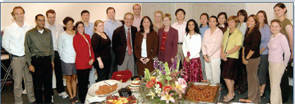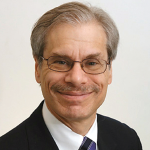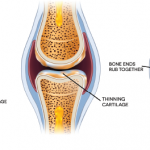
An Extraordinary Mentor
As a mentor, Dr. Felson has consistently guided and nurtured his trainees. Dr. Fraenkel noted that Dr. Felson follows an open-door policy. “We always felt comfortable barging in on him, whether it was to ask a relatively straightforward methodological question or to engage in more weighty conversations regarding research strategies or career planning.”
That was also the experience for Shreyasee Amin, MD, CM, MPH, associate professor of medicine in the division of rheumatology in the department of internal medicine at the Mayo Clinic in Rochester, Minn, when she trained at BU with Dr. Felson. “He was always available to me, but he was not directive,” she says. “He would allow me to work and think through ideas and provide appropriate guidance.” Dr. Amin had originally planned on a two-year research fellowship at BU, but stayed for almost four because of the wealth of opportunities offered her. She also benefitted from Dr. Felson’s interdisciplinary approach to research: “Dr. Felson’s view was that collaboration outside of rheumatology and even outside of epidemiology brings more information and richness to the research.” Working at BU with Dr. Felson, she collaborated with biomechanical engineers at the New England Research Institute to study gait analysis. She is currently involved in osteoporosis research that pairs her with endocrinologists to understand the hormonal and biomarkers aspects of the disease, as well as with NASA scientists to ferret out the interplay of exposure to microgravity and long-term risk for fracture. She has also continued her ongoing collaborations with Dr. Felson’s group at BU examining risk factors for cartilage loss as determined by MRI and knee symptoms in those with knee OA.
“There is no shortage of brilliant professors in academic medicine, but extraordinary mentors are scarce,” wrote Dr. Fraenkel in a 2007 nomination letter to the Teaching Awards Committee at BU School of Medicine. Even more notable, in Dr. Fraenkel’s mind, was Dr. Felson’s belief in the success of his trainees. Toward the end of her fellowship, she developed a research interest outside of Dr. Felson’s niche. (She now concentrates on medical decision-making from the patient and clinician perspective.) “David encouraged me to pursue my research agenda and gave me the protected time, advice, and support I needed to learn new disciplines and to foster collaborations with relevant experts outside of Boston University.”


